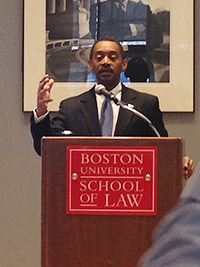Pike Lecture: Top Military Health Official Calls for Civilian Partnerships.
Last April, when the bombs went off at the Boston Marathon finish line, Dr. Jonathan Woodson found himself fielding e-mails in his Pentagon office from former colleagues in Boston, seeking advice on how to care for trauma victims who had lost limbs.
After three years as the top health official for the U.S. Department of Defense, Woodson had seen the synergy between battlefield and civilian medicine from both sides. As a professor of surgery at the Boston University School of Medicine and a vascular surgeon at Boston Medical Center, he had looked to advances in military medicine to inform his own civilian practice.

“There’s a yin and yang” between military and civilian medicine, Woodson said this week, as he returned to the BU campus to deliver the 10th annual Pike Lecture on Health Law, hosted by the schools of law and public health. “Many of the strategies we have developed to save limbs (in wartime) have been transferred to civilian practice.”
As the war in Afghanistan winds down after a dozen years, the challenge for medical professionals is to “secure the partnerships” that will allow for close collaboration between the military and civilian medical systems to ensure that advances in treatment and technology are shared, he said.
Woodson, who was plucked from the BU medical campus in 2010 and nominated by President Obama as Assistant Secretary of Defense for Health Affairs, said the last 12 years of war have been “unprecedented” for the U.S. – not only in terms of length, but in the challenges posed. The use of improvised explosive devices, or IEDs, has intensified the severity of injuries, prompting medical advances in trauma treatment, limb salvage and prosthetics.
Woodson said military medicine has adapted well, with the combat death rate falling from 2005 to 2013, despite a rise in the severity of injuries. That “greater salvage of life” has posed new challenges, as the medical system now must find ways to meet wounded warriors’ “holistic needs” over the long term – a task that includes treating “the mind, body and spirit,” he said.
“The whole idea is that we have a responsibility for making the wounded warrior whole . . . and more importantly, we have to make that commitment for decades.”
While there have been significant technological advances in treating amputees, many of the service members wounded so far suffer from so-called invisible wounds: traumatic brain injury (TBI) and post-traumatic stress disorder (PTSD). More than 280,000 troops have suffered traumatic brain injuries.
Woodson acknowledged that while advances in treating those injuries have been made, “We’re really at the nascent period of understanding neuroscience . . . We don’t know yet much about the long-term outcome” of TBI or PTSD.
He said many of those injured veterans will need care for years to come – a challenge that will require “a public-private partnership” of government, community, academic and philanthropic organizations.
“We have met some of the challenges, but there is clearly more to do,” he said.
Woodson, a brigadier general in the U.S. Army Reserve, noted that the recent wars are the first time that service members have been deployed multiple times to combat – some of them for five or six tours of duty. The effects of those repeat deployments are still unclear, he said, explaining that there has been no clear correlation found between multiple deployments and the incidence of PTSD.
“We haven’t quite sorted out the story about repetitive deployments and PTSD,” he said. There is evidence that some troops who deploy multiple times may have some “protective mechanism” or resilience that guards against psychological injury, he added.
“The bottom line is, we’re not sure what multiple deployments mean,” in terms of psychological impacts, he said.
Because the U.S. force is all-volunteer, many troops who serve want to continue on active duty, even after suffering major injuries, Woodson said. That desire to retain a “military identity” has prompted the armed services to find ways to accommodate injured service members into active duty, sometimes in command or support positions. About 20 percent of amputees return to active duty, for example.
“In a professional force, one of the issues is, people want to go back . . . They define themselves as soldiers, sailors,” he said. “It’s a complicated situation that I don’t know if we fully understand at this time.”
Woodson’s visit to BU comes as School of Public Health researchers are immersed in several projects related to veterans’ health, including piloting a web-based intervention that focuses on self-management to reduce unhealthy drinking in veterans with PTSD. Another ongoing project is large-scale study of veterans of the Gulf War that is examining whether chronic inflammation in the brain, caused by chemical exposure, is a trigger for multi-symptom illness.
Woodson, who was named one of the top vascular surgeons in Boston in 2007 and one of the top surgeons in the U.S. in 2008, said that collaborations with academic institutions are key to ensuring that wartime lessons are incorporated into civilian medicine, and that best practices are shared.
“We’ve got a whole generation of [injured] individuals who started out at age 20” and will need care into their 60s and beyond, he said.
The annual Pike Lecture on Health Law is held in honor of BU School of Law alumni Neal Pike (‘37), a distinguished lawyer and lifelong advocate for individuals with disabilities.
Submitted by Lisa Chedekel